The thyroid is a small, butterfly-shaped gland located in the front of the neck, just below the Adam’s apple. It is an essential part of the endocrine system and plays a crucial role in regulating various bodily functions by producing and releasing hormones.
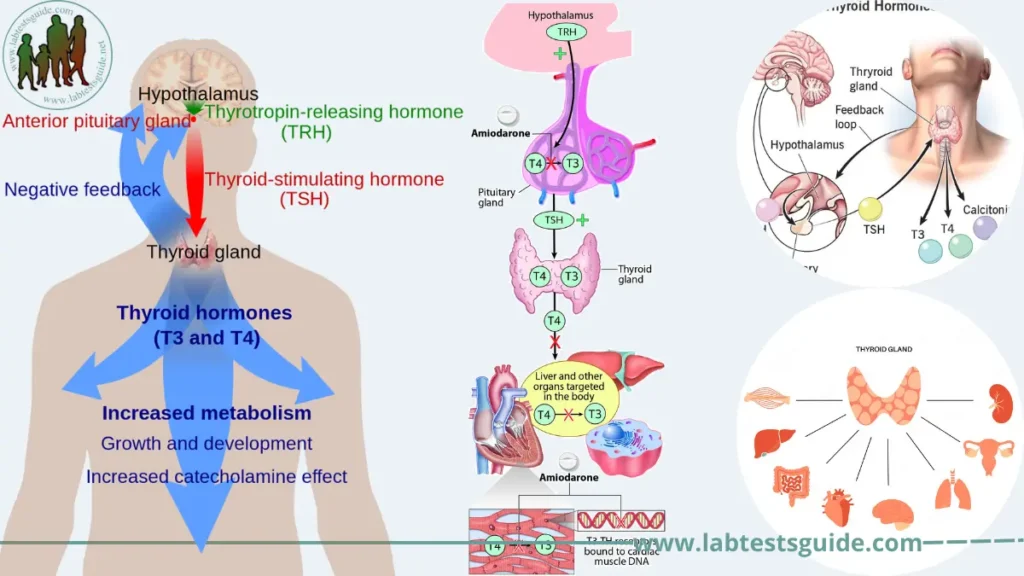
The thyroid is a small, butterfly-shaped gland that sits in the front of your neck. It produces two important hormones: thyroxine (T4) and triiodothyronine (T3). These hormones control the body’s metabolism, which is the process of converting food into energy.
What is the thyroid?
The thyroid is a small gland located in the front of the neck, just below the Adam’s apple. It is shaped like a butterfly and is an essential part of the endocrine system. The thyroid gland produces and releases hormones, primarily triiodothyronine (T3) and thyroxine (T4), which play a vital role in regulating various bodily functions. These hormones influence metabolism, growth, development, and energy expenditure throughout the body. The thyroid gland’s proper functioning is crucial for maintaining overall health and well-being.
What are the hormones produced by the thyroid?
The thyroid gland produces Four main hormones:
- Thyroxine (T4) is the main thyroid hormone. It is made up of four iodine atoms and is the inactive form of thyroid hormone.
- Triiodothyronine (T3) is the active form of thyroid hormone. It is made up of three iodine atoms and is produced from T4 in the body’s tissues.
- Calcitonin is a hormone that helps to regulate calcium levels in the blood. It is produced by the thyroid gland in response to high levels of calcium in the blood.
- Thyroid-stimulating hormone (TSH) is a hormone produced by the pituitary gland to stimulate the thyroid gland to produce T4 and T3. TSH levels are regulated by the amount of thyroid hormone in the blood. When thyroid hormone levels are low, TSH levels increase to stimulate the thyroid gland to produce more T4 and T3. When thyroid hormone levels are high, TSH levels decrease to stop the thyroid gland from producing too much T4 and T3.
What are the functions of the thyroid hormones?
Here are the functions of the thyroid hormones:
- Metabolism. Thyroid hormones help to regulate the body’s metabolism, which is the process of converting food into energy. They do this by increasing the rate at which cells use oxygen and nutrients.
- Growth and development. Thyroid hormones are essential for growth and development, especially during childhood and adolescence. They help to regulate the growth of bones, muscles, and other tissues.
- Heart function. Thyroid hormones help to regulate heart rate and blood pressure. They also help to keep the heart muscle strong and healthy.
- Nervous system function. Thyroid hormones help to regulate brain function and nerve conduction. They also help to protect the brain from damage.
- Bone health. Thyroid hormones help to regulate calcium metabolism and bone growth. They also help to prevent osteoporosis.
- Reproduction. Thyroid hormones are essential for normal reproduction. They help to regulate ovulation and menstruation in women. They also help to produce sperm in men.
- Mood. Thyroid hormones play a role in mood regulation. They help to keep the mood stable and prevent depression.
- Weight. Thyroid hormones help to regulate weight. They help to increase the body’s metabolism and burn calories.
Thyroid hormones are essential for many bodily functions. When thyroid hormone levels are too low or too high, it can cause a variety of symptoms and health problems. If you are concerned about your thyroid health, it is important to see a doctor for evaluation.
Thyroid Hormones:
| Hormone | Function | Normal Range |
|---|---|---|
| Thyroxine (T4) | Main thyroid hormone | 0.8-1.8 ng/dL |
| Triiodothyronine (T3) | Active form of thyroid hormone | 0.2-0.4 ng/dL |
| Thyroid-stimulating hormone (TSH) | Hormone produced by the pituitary gland to stimulate the thyroid gland to produce T4 and T3 | 0.4-4.5 mIU/L |
Common Thyroid Disorders:
Here are some of the most common thyroid disorders:
- Hypothyroidism: A condition in which the thyroid gland doesn’t produce enough thyroid hormones. Symptoms may include fatigue, weight gain, cold intolerance, dry skin, depression, and difficulty concentrating.
- Hyperthyroidism: The opposite of hypothyroidism, where the thyroid gland produces excessive amounts of thyroid hormones. Symptoms of hyperthyroidism may include weight loss, increased heart rate, anxiety, irritability, heat intolerance, and tremors.
- Goiter: An abnormal enlargement of the thyroid gland, often causing a visible swelling in the neck. Goiters can result from iodine deficiency, inflammation, or underlying thyroid disorders.
- Thyroid Nodules: These are abnormal growths or lumps that form within the thyroid gland. Most nodules are benign (non-cancerous), but some may be cancerous. They can sometimes cause problems with hormone production or become large enough to cause difficulty swallowing or breathing.
- Thyroid Cancer: Although relatively rare, thyroid cancer can occur. It usually presents as a lump or nodule in the thyroid gland. Treatment typically involves surgical removal of the cancerous tissue, followed by further treatment if necessary.
Please note that this is not an exhaustive list of thyroid disorders, but it includes some of the most commonly encountered conditions. If you suspect you have a thyroid disorder or have any concerns about your thyroid health, it’s important to consult with a healthcare professional for an accurate diagnosis and appropriate treatment.
Symptoms and Signs of Thyroid Disorders:
Here is a list of common symptoms and signs that can be associated with thyroid disorders:
- Hypothyroidism:
- Fatigue and low energy levels
- Weight gain or difficulty losing weight
- Cold intolerance
- Dry skin and hair
- Constipation
- Muscle weakness or aches
- Depression or mood changes
- Memory problems or difficulty concentrating
- Menstrual irregularities
- Hyperthyroidism:
- Unintentional weight loss or increased appetite
- Rapid or irregular heartbeat
- Elevated blood pressure
- Heat intolerance and excessive sweating
- Tremors or shaking hands
- Nervousness, anxiety, or irritability
- Difficulty sleeping
- Frequent bowel movements or diarrhea
- Changes in menstrual patterns
- Goiter:
- Visible swelling or enlargement in the neck
- Tightness or discomfort in the throat
- Hoarseness or voice changes
- Difficulty swallowing or breathing
- Thyroid Nodules:
- Presence of a lump or swelling in the neck
- Difficulty swallowing or breathing, especially if the nodule is large
- Pain or discomfort in the neck or throat
- Changes in voice or hoarseness
- Some nodules may not cause any noticeable symptoms
- Thyroid Cancer:
- Presence of a lump or nodule in the neck
- Swollen lymph nodes in the neck
- Hoarseness or voice changes
- Difficulty swallowing or breathing
- Pain or discomfort in the neck area
Diagnosis of Thyroid Disorders:
The diagnosis of thyroid disorders typically involves a combination of medical history evaluation, physical examination, and various diagnostic tests. Here are some common methods used in the diagnosis of thyroid disorders:
- Medical History and Physical Examination: Your healthcare provider will begin by asking about your symptoms, medical history, and any family history of thyroid disorders. They will also perform a physical examination, including palpating the thyroid gland in your neck for any abnormalities such as enlargement or nodules.
- Blood Tests: Blood tests are commonly used to measure levels of thyroid-stimulating hormone (TSH), free thyroxine (FT4), and, in some cases, triiodothyronine (T3). Abnormal levels of these hormones can help indicate the presence of thyroid disorders. For example, elevated TSH levels along with low FT4 levels may indicate hypothyroidism, while low TSH levels with high FT4 levels may suggest hyperthyroidism.
- Thyroid Imaging: Imaging techniques such as ultrasound, thyroid scan, or radioactive iodine uptake (RAIU) scan can provide visual information about the size, shape, and structure of the thyroid gland. Ultrasound can also help identify the presence of nodules or abnormalities within the gland.
- Fine-Needle Aspiration (FNA) Biopsy: If a thyroid nodule is detected, your healthcare provider may recommend a biopsy to determine if it is benign (non-cancerous) or cancerous. During an FNA biopsy, a small sample of tissue is obtained from the nodule using a thin needle, which is then examined under a microscope.
- Additional Tests: In certain cases, additional tests may be conducted to assess thyroid function and diagnose specific thyroid disorders. These may include thyroid antibody tests, such as anti-thyroid peroxidase (TPO) antibodies or thyroglobulin antibodies, to help diagnose autoimmune thyroid diseases like Hashimoto’s thyroiditis or Graves’ disease.
It’s important to consult with a qualified healthcare professional if you suspect you have a thyroid disorder or have concerns about your thyroid health. They can evaluate your symptoms, perform the necessary tests, and provide an accurate diagnosis and appropriate treatment plan based on your specific condition.
Treatment and Prevention for Thyroid Disorders:
Here’s a list of common treatment and prevention strategies for thyroid disorders:
Treatment for Thyroid Disorders:
- Hypothyroidism:
- Synthetic Thyroid Hormone Replacement: The most common treatment for hypothyroidism is daily oral intake of synthetic thyroid hormone medication, typically levothyroxine. This medication helps restore normal thyroid hormone levels in the body.
- Hyperthyroidism:
- Antithyroid Medications: Medications such as methimazole or propylthiouracil may be prescribed to reduce the production of thyroid hormones and manage hyperthyroidism.
- Radioactive Iodine Therapy: This treatment involves the oral administration of radioactive iodine, which selectively destroys thyroid cells and reduces hormone production. It is commonly used for long-term management of hyperthyroidism.
- Thyroidectomy: Surgical removal of all or part of the thyroid gland may be recommended in certain cases, especially if other treatments are not effective or contraindicated.
- Goiter:
- Medications: If the goiter is causing hyperthyroidism, antithyroid medications or radioactive iodine therapy may be prescribed. In cases of non-toxic goiter, medication is generally not needed.
- Surgery: Surgical removal of the goiter may be considered if it causes significant symptoms, difficulty swallowing or breathing, or if it is cancerous.
- Thyroid Nodules:
- Observation: Small, benign thyroid nodules may only require regular monitoring without any specific treatment.
- Biopsy and Surgery: If a nodule is suspicious for cancer or causing symptoms, a biopsy may be performed. Surgical removal may be necessary if the nodule is cancerous or causing significant problems.
- Thyroid Cancer:
- Surgery: The main treatment for thyroid cancer involves surgical removal of the cancerous tissue, often along with nearby lymph nodes.
- Radioactive Iodine Therapy: After surgery, radioactive iodine may be given to destroy any remaining cancer cells.
- Thyroid Hormone Replacement: In some cases, thyroid hormone medication may be prescribed to suppress TSH production and prevent cancer recurrence.
Prevention for Thyroid Disorders:
- Iodine Intake: Ensuring adequate iodine intake is important for thyroid health. Consume iodized salt or foods rich in iodine, such as seafood, dairy products, and seaweed.
- Regular Medical Check-ups: Routine medical check-ups can help detect thyroid disorders early, especially if you have a family history or risk factors.
- Avoid Smoking: Smoking has been linked to an increased risk of thyroid disorders, so quitting smoking or avoiding exposure to smoke is recommended.
- Manage Stress: Chronic stress can impact thyroid function. Implement stress-management techniques like exercise, meditation, and relaxation techniques.
- Follow a Balanced Diet: Maintain a healthy, balanced diet with sufficient nutrients to support overall thyroid health.
FAQs:
What is the thyroid gland?
The thyroid gland is a small, butterfly-shaped gland located in the front of the neck. It produces thyroid hormones, which are essential for many bodily functions, including metabolism, growth and development, heart function, nervous system function, bone health, reproduction, mood, and weight.
What are the symptoms of thyroid disorders?
The symptoms of thyroid disorders can vary depending on the specific condition. However, some common symptoms of thyroid disorders include:
- Hypothyroidism: fatigue, weight gain, cold intolerance, constipation, dry skin, hair loss, depression
- Hyperthyroidism: anxiety, weight loss, heat intolerance, increased heart rate, tremors, sweating, irritability
What are the causes of thyroid disorders?
The causes of thyroid disorders can vary depending on the specific condition. However, some common causes of thyroid disorders include:
- Autoimmune diseases: Autoimmune diseases are a group of conditions in which the body’s immune system attacks its own tissues. Some autoimmune diseases, such as Hashimoto’s thyroiditis and Graves’ disease, can cause thyroid problems.
- Iodine deficiency: Iodine is essential for the production of thyroid hormone. If you do not get enough iodine in your diet, you may develop hypothyroidism.
- Thyroiditis: Thyroiditis is an inflammation of the thyroid gland. It can be caused by a number of factors, including infection, autoimmune disease, or medication.
- Thyroid cancer: Thyroid cancer is a rare type of cancer that can develop on the thyroid gland. The exact cause of thyroid cancer is unknown, but it is thought to be linked to a combination of genetic and environmental factors.
What are the risk factors for thyroid disorders?
The risk factors for thyroid disorders can vary depending on the specific condition. However, some common risk factors for thyroid disorders include:
- Age: Thyroid disorders are more common in older adults.
- Gender: Women are more likely to develop thyroid disorders than men.
- Family history: If you have a family history of thyroid disorders, you are more likely to develop them yourself.
- Autoimmune diseases: People with autoimmune diseases, such as rheumatoid arthritis or lupus, are more likely to develop thyroid disorders.
- Iodine deficiency: If you do not get enough iodine in your diet, you are more likely to develop hypothyroidism.
- Thyroiditis: If you have had thyroiditis, you are more likely to develop hypothyroidism or hyperthyroidism.
- Thyroid cancer: People who have had thyroid cancer are more likely to develop hypothyroidism.
What are the complications of thyroid disorders?
Untreated thyroid disorders can lead to a number of health problems, including:
- Heart disease
- Stroke
- Depression
- Osteoporosis
- Weight gain
How are thyroid disorders diagnosed?
The diagnosis of thyroid disorders is made by a doctor based on a patient’s medical history, physical examination, and laboratory tests.
- Medical history: The doctor will ask about the patient’s symptoms, including any changes in energy levels, weight, appetite, sleep, mood, or bowel habits. The doctor will also ask about any family history of thyroid disorders.
- Physical examination: The doctor will examine the patient’s neck for any enlargement of the thyroid gland. The doctor will also check the patient’s heart rate, blood pressure, and reflexes.
- Laboratory tests: The doctor will order blood tests to measure thyroid hormone levels and to check for antibodies that are associated with autoimmune thyroid diseases.
How are thyroid disorders treated?
The treatment of thyroid disorders will vary depending on the specific condition. However, some common treatments for thyroid disorders include:
- Medication: Medications are often used to treat thyroid disorders. Medications can be used to replace thyroid hormone in people with hypothyroidism or to slow down the production of thyroid hormone in people with hyperthyroidism.
- Surgery: Surgery may be used to treat thyroid cancer or to remove a large thyroid nodule that is causing symptoms.
- Radioactive iodine therapy: Radioactive iodine therapy is a type of treatment that uses radioactive iodine to destroy thyroid tissue. Radioactive iodine therapy is often used to treat hyperthyroidism.
Conclusion:
In conclusion, thyroid disorders can significantly impact overall health and well-being. Prompt diagnosis and appropriate treatment are crucial in managing conditions such as hypothyroidism, hyperthyroidism, goiter, thyroid nodules, and thyroid cancer. By recognizing symptoms, seeking medical evaluation, and following recommended treatments, individuals can effectively manage thyroid disorders and maintain optimal thyroid health. Regular check-ups, healthy lifestyle choices, and stress management can also contribute to prevention and overall well-being.
Possible References Used



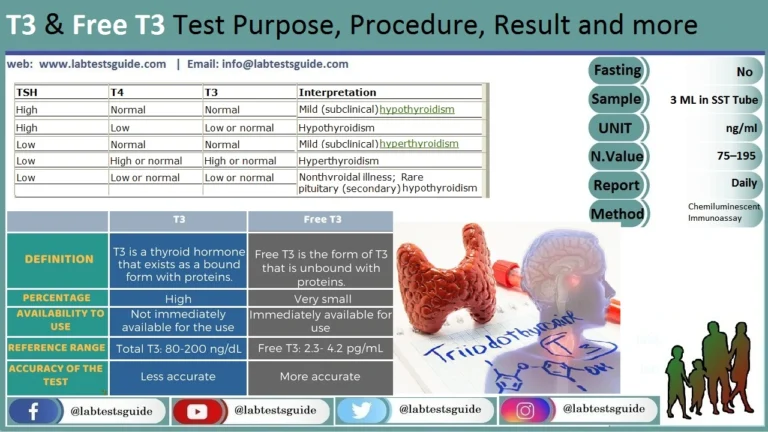
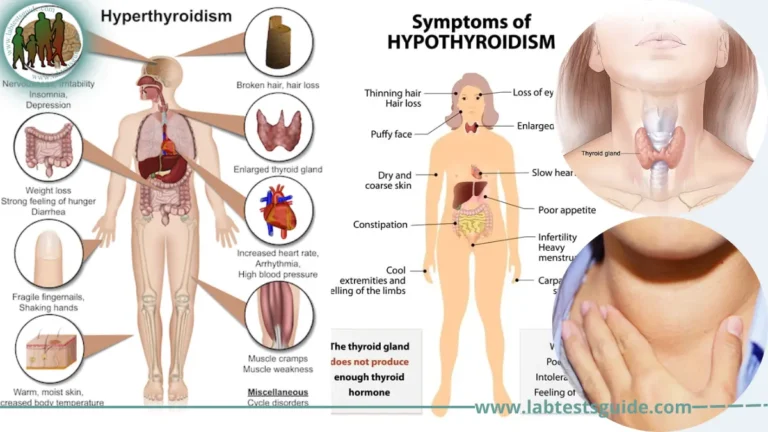

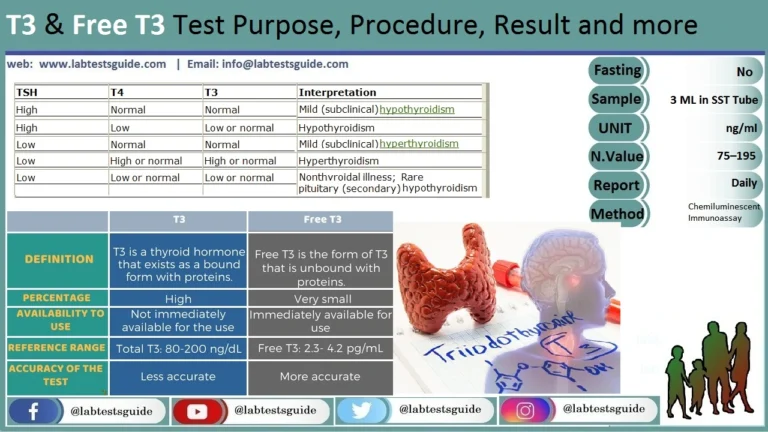
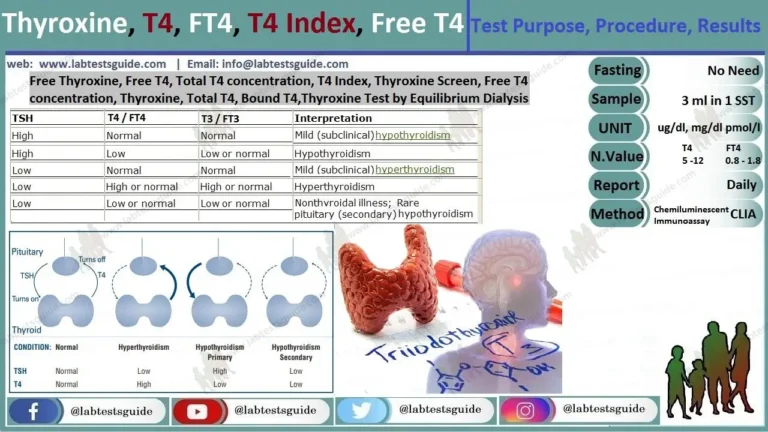
2 Comments